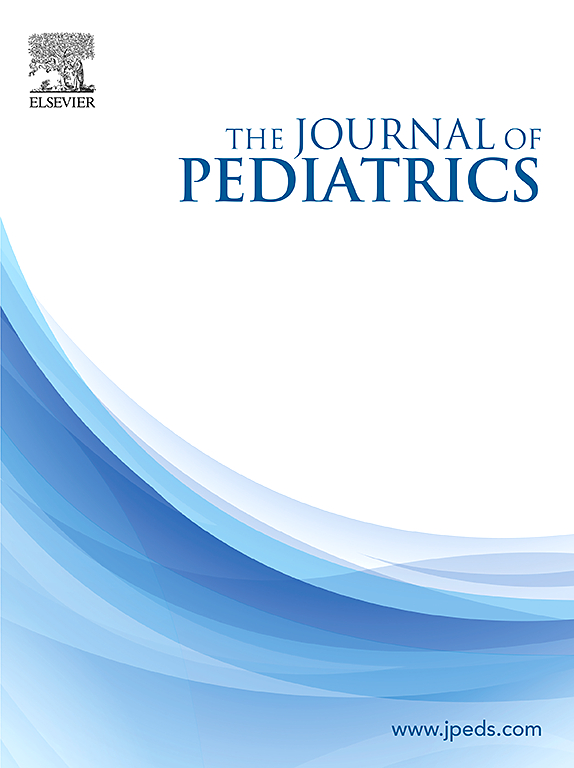Probiotic Receipt and Neurodevelopmental Outcomes of Infants <29 Weeks' Gestation: A Cohort Study
IF 3.5
2区 医学
Q1 PEDIATRICS
引用次数: 0
Abstract
Objective
To examine neurodevelopment and growth following probiotic receipt in neonatal intensive care units.
Study design
A national, population-representative, multicenter, retrospective cohort study was conducted on children born at <29 weeks' gestation between January 1, 2014, and December 31, 2020, from 21 neonatal units in Canada who survived and then underwent follow-up between ages 18 and 30 months. Children who received vs did not receive probiotics were compared for the primary outcome of significant neurodevelopmental impairment, defined as any of the following: Bayley Scales of Infant and Toddler Development-III cognitive, language, or motor score <70; cerebral palsy with Gross Motor Function Classification System III-V; hearing aid or cochlear implant; or bilateral visual impairment. Equivalence analyses utilizing a 4% margin for outcomes between groups were conducted using logistic regression and propensity score-matched analyses to calculate adjusted risk difference (RD) and CIs.
Results
A total of 2749 children in the probiotics group (median gestation 26 weeks and birth weight 920 grams) and 2442 in the no probiotics group (median gestation 26 weeks and birth weight 890 grams) were evaluated. Baseline characteristics were similar between groups. For the outcome of significant neurodevelopmental impairment, logistic regression analyses indicated that probiotics were equivalent to no probiotics (adjusted RD −0.23%, 95% CI: 2.61%, 2.15%), whereas propensity score-matched analyses (1474 pairs of children) indicated probiotics were nonequivalent and potentially superior (adjusted RD −4.01%, 95% CI: 6.92%, −1.01%). Results of the majority of secondary outcomes were similar, including growth outcomes.
Conclusions
Probiotics were not associated with harm in neurodevelopment and growth of surviving preterm neonates and may be potentially superior to no probiotics for neurodevelopment and growth among surviving preterm neonates <29 weeks' gestation.
<29周妊娠婴儿的益生菌摄入与神经发育结局:一项队列研究。
目的:观察新生儿重症监护病房接受益生菌治疗后的神经发育和生长情况。研究设计:一项全国性的、具有人群代表性的、多中心的、回顾性队列研究,研究对象是在以下时间出生的儿童:结果:益生菌组(中位妊娠26周,出生体重920克)共2749名儿童,无益生菌组(中位妊娠26周,出生体重890克)共2442名儿童。各组间基线特征相似。对于显著神经发育障碍的结果,逻辑回归分析表明,益生菌与无益生菌相当(aRD -0.23%, 95%CI: -2.61%, 2.15%),而倾向评分匹配分析(1474对儿童)表明,益生菌不相等,可能更优(aRD -4.01%, 95%CI: -6.92%, -1.01%)。大多数次要结局的结果相似,包括生长结局。结论:益生菌与存活的早产儿神经发育和生长的危害无关,可能比不服用益生菌对存活的早产儿神经发育和生长的影响更大
本文章由计算机程序翻译,如有差异,请以英文原文为准。
求助全文
约1分钟内获得全文
求助全文
来源期刊

Journal of Pediatrics
医学-小儿科
CiteScore
6.00
自引率
2.00%
发文量
696
审稿时长
31 days
期刊介绍:
The Journal of Pediatrics is an international peer-reviewed journal that advances pediatric research and serves as a practical guide for pediatricians who manage health and diagnose and treat disorders in infants, children, and adolescents. The Journal publishes original work based on standards of excellence and expert review. The Journal seeks to publish high quality original articles that are immediately applicable to practice (basic science, translational research, evidence-based medicine), brief clinical and laboratory case reports, medical progress, expert commentary, grand rounds, insightful editorials, “classic” physical examinations, and novel insights into clinical and academic pediatric medicine related to every aspect of child health. Published monthly since 1932, The Journal of Pediatrics continues to promote the latest developments in pediatric medicine, child health, policy, and advocacy.
Topics covered in The Journal of Pediatrics include, but are not limited to:
General Pediatrics
Pediatric Subspecialties
Adolescent Medicine
Allergy and Immunology
Cardiology
Critical Care Medicine
Developmental-Behavioral Medicine
Endocrinology
Gastroenterology
Hematology-Oncology
Infectious Diseases
Neonatal-Perinatal Medicine
Nephrology
Neurology
Emergency Medicine
Pulmonology
Rheumatology
Genetics
Ethics
Health Service Research
Pediatric Hospitalist Medicine.
 求助内容:
求助内容: 应助结果提醒方式:
应助结果提醒方式:


